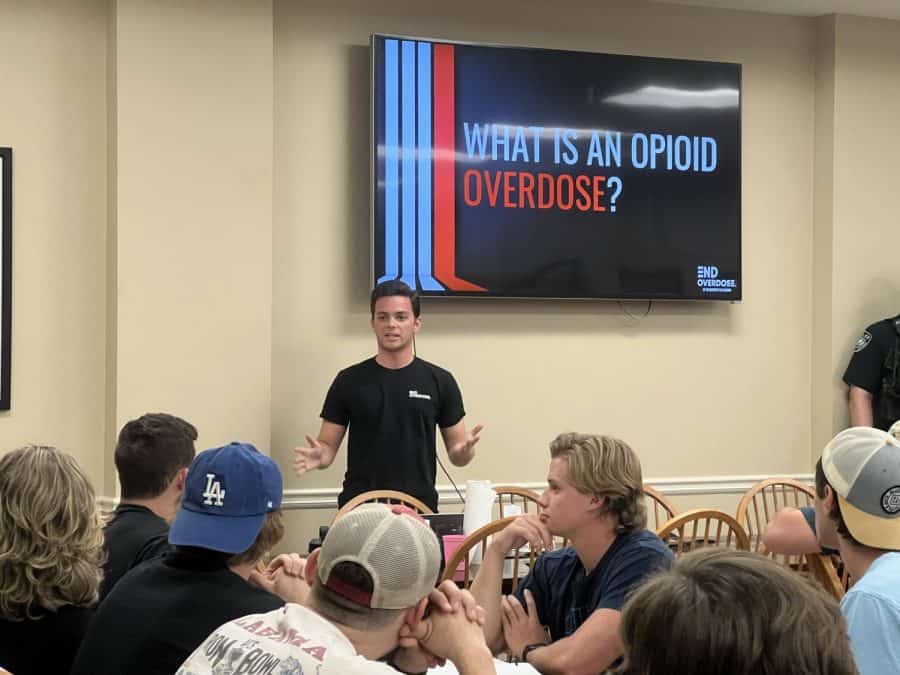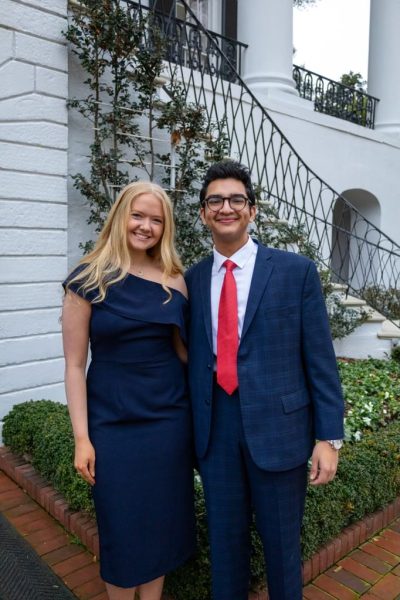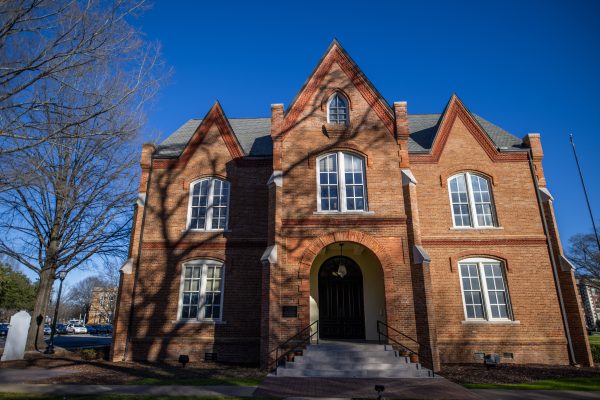Movement to train students on drug overdose prevention and treatment gains momentum
September 21, 2022
Nearly a year after the SGA passed a resolution calling on the University to train students in the administration of Narcan, a medication which treats opioid overdoses, UA End Overdose, a new student organization and chapter of a national non–profit, held its first training in conjunction with UAPD at the Delta Chi fraternity on Sunday.
Mason Schopke, one of the members of Delta Chi who participated in the training program, said that he was “really happy” that the chapter was able to do the training.
“There is some people in the house that do [drugs] sometimes so if something were to ever happen, I’m happy to know that I could help them if something bad happens,” Schopke said.
Members of Delta Chi were instructed on how to identify an overdose, steps to take once an overdose has been identified and how to administer Narcan. After the training, Delta Chi received a kit with Narcan, fentanyl testing strips, a protective face shield and informational materials.
The road to this point was not easy. John McLendon, the SGA senator who authored last year’s resolution and the vice president of Delta Chi, said that despite trying to “get the ball rolling” on getting students trained, he quickly discovered how difficult it was to gain momentum on his own.
“To be honest, it was pretty overwhelming,” McLendon said. “I was doing it all on my own.”
Enter Hayden Rutter, the president and founder of the UA End Overdose chapter, who said he was inspired to bring the organization to campus after volunteering with End Overdose in his hometown of Los Angeles.
“There were other chapters established at UCLA, University of Washington, UC Riverside; I felt that it was important that we bring it to The University of Alabama,” Rutter said. “There really has to be a response on campus, and I felt that I could be that response … It’s really an issue that we feel like we have to tackle at the community level to be able to combat the issue.”
Based in Los Angeles, the national End Overdose organization was founded in 2018 and has been “working to end drug-related overdose deaths through education, medical intervention, and public awareness,” according to their mission statement.
Rutter said that he felt there was a lack of awareness among students when it came to the dangers that drugs can pose. He added that while he thinks that new students tend to experiment with drugs, he doesn’t believe there is a drug problem on campus.
“I don’t feel that they deserve to die as a result of trying something one night and trying to have a good time,” Rutter said.
Tuscaloosa stands to benefit from the organization’s presence. Alabama has the highest opioid dispensing rate in the country according to the Centers for Disease Control and Prevention, and Tuscaloosa County has an even higher rate than the overall state. In 2020, — the last year that the CDC released data — over 1,000 Alabamians died from a drug overdose.
Joseph Olejniczak, another member of Delta Chi who was certified as part of the training program, said that he had needed to administer Narcan to friends of his who overdosed in the past, leading him to educate himself on the issue before his fraternity was trained.
“It’s a really important thing, especially on this campus,” Olejniczak said. “There’s a lot of overdoses, there is a lot of illicit drugs on campus and there’s a lot of fentanyl in that … Nothing’s worse than a 17- or 18-year-old just passing away because of somebody who laced drugs.”
Olejniczak also criticized the University and the state of Alabama’s stance on drugs.
“If they’re a bit more accepting of people who are addicted to drugs, and offer help and ways to decrease usage … as opposed to just saying ‘You’re a terrible person if you do this,’ it would help a lot,” Olejniczak said. “There would be a lot less deaths; a lot less permanent damage.”
McLendon, who is now a member of UA End Overdose, and Rutter aren’t the only ones who have contributed to the effort to train students. Tyler Zuspann, another SGA senator and the vice president of UA End Overdose, co-authored an act alongside Speaker of the Senate CJ Pearson that established a training program called the Good Samaritan Organizational Training Program. The act passed unanimously on Sept. 8.
“It’s a lot easier to get stuff done when there’s a whole organization behind you. And it’s [End Overdose] a pretty solid organization,” McLendon said.
Under the act, the SGA will work in partnership with UA End Overdose and UAPD to provide trainings to “inform participating students about Good Samaritan laws and policies, signs and symptoms of potential drug overdoses, and the proper use and administration of Narcan and fentanyl testing strips.”
“The SGA is in full support of UA End Overdose and their mission to aid our campus community,” said Trinity Hunter, the SGA press secretary. “As Delta Chi serves as the first organization to partner with this initiative, we are thrilled to know that students at the University of Alabama have a passion for working with their peers to create a more accessible and safer environment for all.”
Student organizations will receive a Good Samaritan Organizational Certification if at least 25% of its active membership completes the new training program, which requires individual members to take an assessment at the end of the training and get five out of six questions correct. According to Zuspann, the 25% goal for certification was chosen so that Greek organizations can train their freshman members each year and be recertified.
According to the Addiction Center, students who participate in Greek life are one of the student groups that “may be at a higher risk of encountering and abusing drugs.”
Other at-risk student groups include student-athletes, on-campus residents, those with a history of mental illness and those under a high degree of stress.
John Hooks, the UAPD chief of police, said in a statement that UAPD is “very pleased” to work with UA End Overdose to provide the training.
“It’s a worthy and heroic endeavor they are undertaking and we want to contribute to however we can,” Hooks said.
According to Rutter, UA End Overdose worked with the Alabama Department of Mental Health to receive a supply of Narcan, which is currently free of charge in the state under a standing order issued by the State Health Officer, Dr. Scott Harris. The standing order requires that anyone who wants to fill a Narcan prescription must first complete administration training.
Despite Narcan being free of charge, the fentanyl testing strips that UA End Overdose provides are not. Rutter said that one of the hurdles the organization is facing is the cost of the strips.
“We’re trying to find other organizations that would be willing to donate to our organization to get these fentanyl test strips,” Rutter said.
McLendon said that everyone in his fraternity “was really supportive” of his work with End Overdose.
“I feel like it’s a big stepping stone once we get Delta Chi certified … And once we get a few, there’s no telling what we can do,” McLendon said in an interview before the training.
Following the event, Rutter expressed excitement at what was to come for his organization, adding that he thought the first training was “really successful.” Rutter said that other trainings for other organizations are in the works for the coming week.
“We had a lot of people listening and being attentive during the presentation; I think that’s important for what we’re dealing with,” Rutter said.











